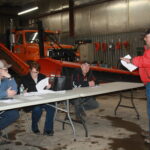The city of Caribou has become the headquarters for federal and state agencies providing relief and assistance to those areas ravaged by one of the worst floods to hit northern Maine in recent history. Flooding that stretched from Island Falls to Fort Kent has impacted more than 400 homes. The St. John Valley town received the most damage when waters of the Fish River and the St. John overflowed their banks last Wednesday. Town officials said that it was the worst flooding in a century.
Other flooding, although minor, was experienced in the Van Buren, Washburn, Ashland, Portage and Island Falls areas.
Gov. John E. Baldacci has requested a federal disaster of declaration, but as of Tuesday, there has been no response from the federal government. There were no injuries reported despite the massive flooding, according to Vern Ouellette, director of the Aroostook County Emergency management Services office in Caribou. EMS personnel have joined with “just about” every state agency and the American Red Cross to help those affected the by the flood.
The Federal Emergency Management Agency has established a headquarters in the basement-level conference room of the Caribou Courthouse. A team of 16 FEMA workers, from throughout the country, set out early Tuesday morning to visually evaluate property damaged by flooding.
Cables connecting faxes, telephones and computers have been strung into the courthouse conference room, enabling workers to process requests for help.
The American Red Cross has set up shop at the Caribou Inn and Convention Center to direct the efforts of more than 50 workers. When flooding initially occurred last week, a Red Cross emergency shelter was set up at the University of Maine at Fort Kent.
Meanwhile, the Good Shepherd Food Bank of Auburn has sent three tractor-trailer loads of water and food up to Catholic Charities of Maine in Caribou for distribution.
Last week, the rising floodwaters forced the closure of bridges spanning the St. John and the Fish rivers, as well as the International Bridge in Van Buren and the Tucker Bridge in Moro Plantation. A total of 45 roads across the state were affected or closed by the flood, according to state officials.
Heavy rains combined with melting snow to cause the St. John River to rise 8.1 feet in less that 24 hours last week, surging to almost 30 feet, well above the 25-foot flood stage. Officials ordered mandatory evacuation of some downtown areas in Fort Kent. A trailer park was also evacuated in Washburn as the rising Salmon Brook endangered that area.
Area schools, including the University of Maine at Fort Kent, were closed for several days. Businesses also closed their doors against the floodwaters.
Residents of Little Madawaska Lake in Westmanland Plantation were stranded last Wednesday when the Madawaska River covered the bridge. According to the Caribou Fire Department, a woman became stranded at the larger Madawaska Lake when she apparently attempted to cross a flooded shore road.
Over the weekend a team of engineers from Maine and New Brunswick examined the International Bridge in Fort Kent and reopened it for traffic.
“We had to remove a tremendous amount of debris from the bridge and its supports, but there was no structural damage to the bridge caused by the flood,” said John Buxton, chief bridge engineer with the Maine Department of Transportation.
The Main Street Bridge, which crosses the Fish River in Fort Kent, also was reopened.
DOT officials said that the Moro Plantation bridge on Route 11 was damaged by the flood and remained closed, but that the Route 161 bridge between Allagash and Fort Kent was reopened over the weekend.
According to Ouellette FEMA officials arrived Tuesday in order to start processing individual and public assistance cases. Homeowners, as well as town experiencing infrastructure damage, may be eligible.
Individuals working at the FEMA headquarters will be assessing claims and also travel to the damaged sites to visually inspect the property, Ouellette explained.
The Maine Emergency management Agency has asked property owners who suffered flood damage to call 211 to report the damage.
“This is not an application for assistance,” said MEMA director Robert McAleer. “We need to know who many people have been impacted and where they are, in order to assess what kinds of assistance might be available.
Meanwhile, three tractor-trailer loads of food and water have rolled in the county from the Good Shepherd Food Bank in Auburn. The Catholic Charities of Maine in Caribou has become a central distribution point for the supplies for the flood-ridden area, according to Jason Hall, agency relations’ director of the Good Shepherd Food Bank.
Hall said that there remains a need for water and for personal hygiene products, such as shampoo, toothpaste and laundry detergent. Officials have warned residents affected by flooding to have their wells tested.
In addition, there are problems in reaching the small communities, such as Masardis, Wallagrass and Soldier Pond, Hall said.
A statement from the American Red Cross said that the agency is providing over 300 meals to local residents and emergency responders twice a day. The Good Shepherd Food pantry is supplying the food, while workers from the Salvation Army from Lewiston are preparing the food and the Red Cross’s Emergency Response Vehicles are delivering the food.
Red Cross volunteers are patrolling impacted neighborhoods to distribute public health information flyers, personal hygiene packs and other materials.
According to Red Cross public affairs director, Carol McAllister, 831 meals and 80 cleanup kits were distributed in three days.
A service delivery site has been established in Fort Kent at the Lonesome Pine Trails Ski Lodge where the Salvation Army will continue to serve meals, according to McAllister. People needing assistance should call the Red Cross directly at 1-866-438-4636 for a Red Cross worker to come to their residence for one on one assistance.
Needs also are being assessed in the Island falls region, north along Route 1 to Fort Kent and south along Route 11 to Oxbow, according to Red Cross officials.
McAllister said that the relief effort is buoyed by both staff and volunteers from across the entire state. In addition the local Red Cross office has been working on taking donations to defray the costs of the relief effort.
Also responding to the effort was the Caribou Emergency Management Agency, which set up a feeding station for personnel involved in the relief effort in Fort Kent, according to the local EMA director, Roy Woods.
Gov. Baldacci and the state’s four congressional representatives toured the flood damage last week. U.S. Sens. Olympia J. Snowe and Susan Collins have sent a letter to President Bush supporting the request for federal disaster assistance.
Citing FEMA statistics, the senators’ letter said that flooding damage was reported in the six Maine counties of Aroostook, Knox, Lincoln, Penobscot, Piscataquis and Waldo. However, Aroostook County is the only county where there will be “individual assistance” relief from FEMA.
The other counties will have public assistance, where funds may be available to municipalities, as opposed to individuals.
U.S. Rep. Mike Michaud also wrote to Bush urging the president’s approval of expedited federal assistance.
The governor’s request was the second time this year that an appeal was made for federal help. After a March blizzard, the governor asked for help but was denied. An appeal on that request is pending.
Other flooding, although minor, was experienced in the Van Buren, Washburn, Ashland, Portage and Island Falls areas.
Gov. John E. Baldacci has requested a federal disaster of declaration, but as of Tuesday, there has been no response from the federal government. There were no injuries reported despite the massive flooding, according to Vern Ouellette, director of the Aroostook County Emergency management Services office in Caribou. EMS personnel have joined with “just about” every state agency and the American Red Cross to help those affected the by the flood.
The Federal Emergency Management Agency has established a headquarters in the basement-level conference room of the Caribou Courthouse. A team of 16 FEMA workers, from throughout the country, set out early Tuesday morning to visually evaluate property damaged by flooding.
Cables connecting faxes, telephones and computers have been strung into the courthouse conference room, enabling workers to process requests for help.
The American Red Cross has set up shop at the Caribou Inn and Convention Center to direct the efforts of more than 50 workers. When flooding initially occurred last week, a Red Cross emergency shelter was set up at the University of Maine at Fort Kent.
Meanwhile, the Good Shepherd Food Bank of Auburn has sent three tractor-trailer loads of water and food up to Catholic Charities of Maine in Caribou for distribution.
Last week, the rising floodwaters forced the closure of bridges spanning the St. John and the Fish rivers, as well as the International Bridge in Van Buren and the Tucker Bridge in Moro Plantation. A total of 45 roads across the state were affected or closed by the flood, according to state officials.
Heavy rains combined with melting snow to cause the St. John River to rise 8.1 feet in less that 24 hours last week, surging to almost 30 feet, well above the 25-foot flood stage. Officials ordered mandatory evacuation of some downtown areas in Fort Kent. A trailer park was also evacuated in Washburn as the rising Salmon Brook endangered that area.
Area schools, including the University of Maine at Fort Kent, were closed for several days. Businesses also closed their doors against the floodwaters.
Residents of Little Madawaska Lake in Westmanland Plantation were stranded last Wednesday when the Madawaska River covered the bridge. According to the Caribou Fire Department, a woman became stranded at the larger Madawaska Lake when she apparently attempted to cross a flooded shore road.
Over the weekend a team of engineers from Maine and New Brunswick examined the International Bridge in Fort Kent and reopened it for traffic.
“We had to remove a tremendous amount of debris from the bridge and its supports, but there was no structural damage to the bridge caused by the flood,” said John Buxton, chief bridge engineer with the Maine Department of Transportation.
The Main Street Bridge, which crosses the Fish River in Fort Kent, also was reopened.
DOT officials said that the Moro Plantation bridge on Route 11 was damaged by the flood and remained closed, but that the Route 161 bridge between Allagash and Fort Kent was reopened over the weekend.
According to Ouellette FEMA officials arrived Tuesday in order to start processing individual and public assistance cases. Homeowners, as well as town experiencing infrastructure damage, may be eligible.
Individuals working at the FEMA headquarters will be assessing claims and also travel to the damaged sites to visually inspect the property, Ouellette explained.
The Maine Emergency management Agency has asked property owners who suffered flood damage to call 211 to report the damage.
“This is not an application for assistance,” said MEMA director Robert McAleer. “We need to know who many people have been impacted and where they are, in order to assess what kinds of assistance might be available.
Meanwhile, three tractor-trailer loads of food and water have rolled in the county from the Good Shepherd Food Bank in Auburn. The Catholic Charities of Maine in Caribou has become a central distribution point for the supplies for the flood-ridden area, according to Jason Hall, agency relations’ director of the Good Shepherd Food Bank.
Hall said that there remains a need for water and for personal hygiene products, such as shampoo, toothpaste and laundry detergent. Officials have warned residents affected by flooding to have their wells tested.
In addition, there are problems in reaching the small communities, such as Masardis, Wallagrass and Soldier Pond, Hall said.
A statement from the American Red Cross said that the agency is providing over 300 meals to local residents and emergency responders twice a day. The Good Shepherd Food pantry is supplying the food, while workers from the Salvation Army from Lewiston are preparing the food and the Red Cross’s Emergency Response Vehicles are delivering the food.
Red Cross volunteers are patrolling impacted neighborhoods to distribute public health information flyers, personal hygiene packs and other materials.
According to Red Cross public affairs director, Carol McAllister, 831 meals and 80 cleanup kits were distributed in three days.
A service delivery site has been established in Fort Kent at the Lonesome Pine Trails Ski Lodge where the Salvation Army will continue to serve meals, according to McAllister. People needing assistance should call the Red Cross directly at 1-866-438-4636 for a Red Cross worker to come to their residence for one on one assistance.
Needs also are being assessed in the Island falls region, north along Route 1 to Fort Kent and south along Route 11 to Oxbow, according to Red Cross officials.
McAllister said that the relief effort is buoyed by both staff and volunteers from across the entire state. In addition the local Red Cross office has been working on taking donations to defray the costs of the relief effort.
Also responding to the effort was the Caribou Emergency Management Agency, which set up a feeding station for personnel involved in the relief effort in Fort Kent, according to the local EMA director, Roy Woods.
Gov. Baldacci and the state’s four congressional representatives toured the flood damage last week. U.S. Sens. Olympia J. Snowe and Susan Collins have sent a letter to President Bush supporting the request for federal disaster assistance.
Citing FEMA statistics, the senators’ letter said that flooding damage was reported in the six Maine counties of Aroostook, Knox, Lincoln, Penobscot, Piscataquis and Waldo. However, Aroostook County is the only county where there will be “individual assistance” relief from FEMA.
The other counties will have public assistance, where funds may be available to municipalities, as opposed to individuals.
U.S. Rep. Mike Michaud also wrote to Bush urging the president’s approval of expedited federal assistance.
The governor’s request was the second time this year that an appeal was made for federal help. After a March blizzard, the governor asked for help but was denied. An appeal on that request is pending.







